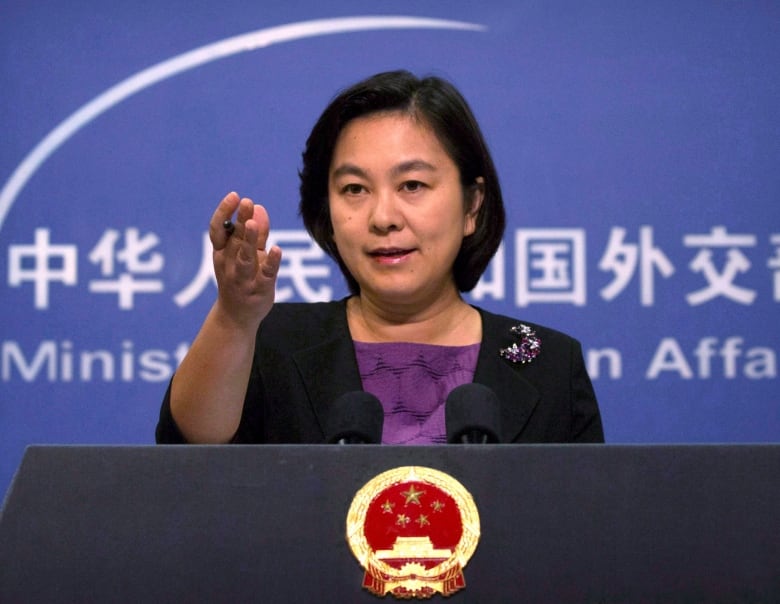China warns of retaliation after Trump threatens fresh tariffs
Chinese spokesperson urges the U.S. to 'give up its illusions'
China on Friday said it would not be blackmailed and warned of retaliation after U.S. President Donald Trump vowed to slap a 10 per cent tariff on $300 billion US of Chinese imports from next month, sharply escalating a trade row between the world's biggest economies.
Trump on Thursday stunned financial markets by saying he plans to levy the additional duties from Sept. 1, marking an abrupt end to a truce in a year-long trade war that has slowed global growth and disrupted supply chains.
Beijing would not give an inch under pressure from Washington, Chinese foreign ministry spokesperson Hua Chunying said.
"If America does pass these tariffs then China will have to take the necessary countermeasures to protect the country's core and fundamental interests," Hua told a news briefing in Beijing.
"We won't accept any maximum pressure, intimidation or blackmail. On the major issues of principle we won't give an inch," she said, adding that China hoped the U.S. would "give up its illusions" and return to the right track of negotiations based on mutual respect and equality.
Trump also threatened to further raise tariffs if Chinese President Xi Jinping fails to move more quickly to strike a trade deal.
New duties affect almost all Chinese goods
The newly proposed wave of duties would extend Trump's tariffs to nearly all of the Chinese goods that the United States imports.
Trump made his threat in a series of Twitter posts after his top trade negotiators briefed him on a lack of progress in U.S.-China talks in Shanghai this week.
...during the talks the U.S. will start, on September 1st, putting a small additional Tariff of 10% on the remaining 300 Billion Dollars of goods and products coming from China into our Country. This does not include the 250 Billion Dollars already Tariffed at 25%...
19.3K people are talking about this
The president later said if trade discussions fail to progress he could raise tariffs further — even beyond the 25 per cent levy he has already imposed on $250 billion US of imports from China.
Senior Chinese diplomat Wang Yi told reporters on the sidelines of an Association of Southeast Nations event in Thailand the additional tariffs were "not a correct way" to deal with the bilateral dispute.
Financial markets in tailspin
The news hit U.S. and Asian financial markets hard. Oil prices plummeted seven per cent and retail associations predicted a spike in consumer prices.
Asked about the impact on financial markets, Trump told reporters: "I'm not concerned about that at all."
"President Trump is, in effect, using American families as a hostage in his trade war negotiations," said Matt Priest, president of the Footwear Distributors and Retailers of America.
Stephen Lamar, executive vice president of the American Apparel & Footwear Association, said his group's members were shocked that Trump had not allowed the resumed U.S.-China trade talks to proceed further before acting.
Chinese manufacturers produce 42 per cent of apparel and 69 per cent of footwear purchased in the U.S., Lamar said.
Moody's said the new tariffs would weigh on the global economy at a time when growth is already slowing in the U.S., China and the eurozone.
China can retaliate
Possible retaliatory measures by China could include tariffs, a ban on the export of rare earths and penalties against U.S. companies in China, analysts say.
So far, Beijing has refrained from slapping tariffs on U.S. crude oil and big aircraft, after cumulatively imposing additional retaliatory tariffs of up to 25 per cent on about $110 billion US of U.S. goods since the trade war broke out last year.
China is also drafting a list of "unreliable entities" - foreign firms that have harmed Chinese interests. U.S. delivery giant FedEx is under investigation by China.
U.S. Trade Representative Robert Lighthizer and Treasury Secretary Steven Mnuchin briefed Trump on their first face-to-face meeting with Chinese officials since Trump met Xi at the G20 summit at the end of June and agreed to a ceasefire in the trade war.
"When my people came home, they said, 'We're talking. We have another meeting in early September.' I said, 'That's fine, but until such time as there's a deal, we'll be taxing them," Trump told reporters.
A source familiar with the matter said Trump grew frustrated and composed the tweets shortly after Lighthizer and Mnuchin told him China made no significant movement on its position.
Previous negotiations collapsed in May, when U.S. officials accused China of backing away from earlier commitments.





No comments:
Post a Comment
Comments always welcome!